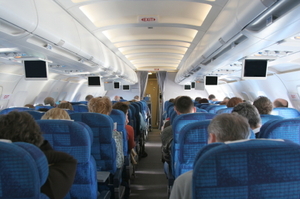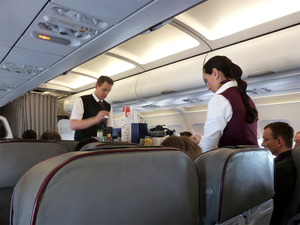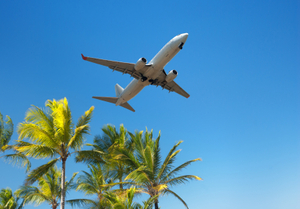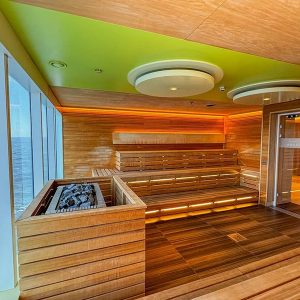While air travel may be the fastest, most convenient and safest way to travel to a holiday destination, the down-side is that the physical change in atmosphere can cause breathlessness, cramp, dehydration, dry eyes, swollen feet, dry skin, ear pain, headaches and even panic attacks. However, with the right know-how, some or all of the physical down-sides can be avoided or alleviated.
Silver Travel Advisor pharmacist and natural health consultant Dave Harcombe says: “Airplanes are pressurised to a level which is equivalent to being 7000 feet up a mountain. At 37,000 feet the gas in the body expands in volume by around 30%, air in the middle ear expands, oxygen levels from around 21% to 15%, pressurisation of cabin air reduces humidity from a comfortable 60% to just 20%. And this is why our bodies struggle to cope with the changes as we are launched into a new and alien environment within minutes of take-off.”
Bloating
 At a cruising height of 37,000 feet the gas in the body expands in volume by around 30%. Not only does this lead to a tighter waistband, but the increased gas can be unpleasant for passengers as well as for those around them. Worse still, those suffering from a fracture can find the air trapped between the skin and the plaster cast, leading to gangrene in the worst case scenario. And ostomy patients are advised to carry extra bags, in case of leakage.
At a cruising height of 37,000 feet the gas in the body expands in volume by around 30%. Not only does this lead to a tighter waistband, but the increased gas can be unpleasant for passengers as well as for those around them. Worse still, those suffering from a fracture can find the air trapped between the skin and the plaster cast, leading to gangrene in the worst case scenario. And ostomy patients are advised to carry extra bags, in case of leakage.
Top tips for avoiding a messy and gaseous situation are to avoid fizzy drinks and gas producing foods, such as turnips, cabbage, beans and curries and chewing gum. Wear loose and comfortable clothing, eat and drink in moderation and try taking a drop of peppermint oil mixed with a teaspoon of honey, dissolved in hot water taken before the flight.
Popping ears
This is due to gas expanding and escaping through the eustachian tube in the middle ear. During descent of an aircraft the opposite happens – the air in the ear contracts and produces pain in the middle ear.
Try yawning, swallowing, drinking fluids, or sucking a sweet to relieve the discomfort. Letting a young child cry on descent is probably the best thing to do and travellers who suffer from sinus problems should always carry decongestants in their hand luggage. Take the day before and during the flight.
Dryness
Pressurisation of cabin air also leads to moisture removal and a low humidity level (around 20% in most cabins). A comfortable humidity is around 60%. Any increase in humidity during the flight is mainly from fellow passengers!
 Dry cabin air has an accelerated drying effect on contact lens. Eye specialists now recommend the removal of contact lens if the flight is over 4 hours. As well as dry eyes, dryness of mouth, throat, nose and skin occurs quickly. Headaches are common and so is constipation. Apply moisturisers and lip balm at least once during the flight. Try an essential oil spritzer spray to cool and refresh the skin or put a few drops of lavender oil into a spray bottle with mineral water. Avoid coffee, tea and alcohol as all three contain diuretics which dehydrate the body even more. Instead, drink plenty of water and fruit juices.
Dry cabin air has an accelerated drying effect on contact lens. Eye specialists now recommend the removal of contact lens if the flight is over 4 hours. As well as dry eyes, dryness of mouth, throat, nose and skin occurs quickly. Headaches are common and so is constipation. Apply moisturisers and lip balm at least once during the flight. Try an essential oil spritzer spray to cool and refresh the skin or put a few drops of lavender oil into a spray bottle with mineral water. Avoid coffee, tea and alcohol as all three contain diuretics which dehydrate the body even more. Instead, drink plenty of water and fruit juices.
Cramp and swelling
Long haul flights are notorious for causing cramp; extensive sitting upright results in swollen feet and ankles and shoes that no longer fit by the end of the flight. To prevent take frequent walks during the flight – hourly if possible.
Five drops of lavender oil on a damp cloth makes an ideal compress to massage swollen feet and ankles. Gently massage in an upward direction to the bottom of each calf for a few minutes. A geranium oil compress is useful if you are prone to cramp. There is mounting evidence that flying also contributes to an increased risk of developing deep vein thrombosis (blood clots) in the legs. It is advisable to take a low dose ASPIRIN 75MG as a cheap and effective preventative. Consult your doctor to check if it is safe to do so.
Travel sickness
Approximately one third of the population suffer from travel sickness at some time. Surprisingly flying only affects approximately 2% of passengers presumably because the aircraft fly above the main turbulence. The best way to deal with travel sickness is to take preventative action. Pharmacists offer a multitude of remedies, for example, Stugeron which is popular as it produces lower than usual sedation. Chewing raw ginger can help too or put 3 drops of ginger oil onto a handkerchief and inhale. Distracting a person’s attention will often prevent travel sickness, or focussing on a distant point. Watching the in-flight movie may provide all the distraction that is needed. Other measures include sitting over-wing, the most stable part of the plane, and try and get plenty of fresh air through the air vent above the seat.
Jet lag
Measures to combat it jet-lag (if travelling east) – on the morning of arrival try to stay indoors out of natural daylight and rest until the afternoon as this will help to advance the body clock. If travelling west – try to follow the same wake, eat and sleep timetables as the locals and the body clock will adjust accordingly. A long soak in a bath of oil of grapefruit and lavender, deeply inhaling the aroma does help the body adjust to the difference in time zones.
Fear of flying
As many as 20 – 30% have a fear of flying and for between 2 and 10% of the population, it is a phobia. Most drug therapy is ineffective, sedatives provide short term respite and attempts to drown fears in a few G&Ts will result in sore heads and extreme dehydration. Education, exposure therapy, cognitive restructuring and relaxation techniques are the most effective, non-pharmaceutical treatments.  Learning to fly on a simulator, sky diving or taking flight lessons, sitting in a parked plane and learning how aircraft fly are the most successful ways to control the overactive release of amygdala – the part of the brain responsible for the release of stress hormones that can leave a passenger terrified. For some, just the close proximity of others is enough to trigger a reaction, in which case, upgrading to Business or First Class may help counter pteromerhanophobia (fear of flying).
Learning to fly on a simulator, sky diving or taking flight lessons, sitting in a parked plane and learning how aircraft fly are the most successful ways to control the overactive release of amygdala – the part of the brain responsible for the release of stress hormones that can leave a passenger terrified. For some, just the close proximity of others is enough to trigger a reaction, in which case, upgrading to Business or First Class may help counter pteromerhanophobia (fear of flying).
Breathing difficulties
A further potential health problem comes from breathing in reduced levels of oxygen. In a plane air contains only about 15% of oxygen compared with 21% in a normal environment. As a result, passengers with respiratory problems may experience breathing difficulties and should discuss this with their G.P. before travelling.
Asthmatic patients should carry their inhalers in their hand luggage and have them accessible at all times. As inhalers occasionally don’t work correctly it is always wise to carry spare inhalers. Chronic asthmatics can purchase nebulisers that work both off the mains and battery and they should be carried onto the plane as hand luggage.
Diabetic advice
Diabetic control may become a problem during a long haul flight, especially if the passenger is travel sick. Insulin should be kept in the hand luggage and preferably in two separate places, just in case some is lost. Jet lag may affect the control of both diabetics and epileptics leading to dose adjustment.











